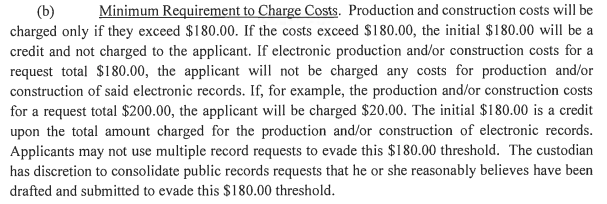Wyoming’s new records fee policies were recently put to the test when the state’s Department of Environmental Quality were found to have charged over $400 for a request that fell well under the state’s new threshold for charging of electronic records.
The Powder River Basin Resource Council made two requests for email correspondence to the DEQ. The first was estimated to cost more than $1,000 as the request generated over 4,000 responsive emails. The Council had to withdraw this request since the fee was way higher than their budget.
“We have to think twice before paying any fees,” said staff attorney for the PRBRC, Shannon Anderson. “If we have to forgo getting records because of high fees, it will be difficult for us to continue our work. The records are needed to allow us to participate in permitting processes and otherwise exercise our rights under the public participation provisions of our state and federal environmental laws.”
The second request produced over 1,200 records and was quoted at $453. A more affordable cost for the group, the PRBRC prepaid $273 to complete the request. This was a first for the DEQ, as its never had to charge a prepayment fee.
“In the rules, the law says we cannot handle confidential and trademark material, so we can’t be held liable for that. So it’s important that we review emails and attachment that don’t need to be released,” said Public Information Officer for the Wyoming DEQ, Keith Guille.
Recently, the state’s Department of Administration and Information set rules that allow agencies to charge fees for completing records requests, including electronic requests. The rules the DAI wrote established a new policy enabling all state agencies to charge the public for any records request that would cost $180 or more to fulfill.

However, the fees apply only to electronic records and requesters are still allowed to enter offices and review records in person, where they’ll only be charged for making copies. Charges are calculated using employee salaries, but the money paid does not reimburse the agency whose staff time is used. The money is instead returned to Wyoming’s general fund, which lawmakers appropriate from when they write the state’s budget.

But after the DEQ processed the request, they realized the time it spent to fulfill the request fell well under the initial estimate of $453.
“The issue is, when we pull records for every request, it will be different. You may have ones that have many duplicates but other requests may not,” added Guille. “As we move through the process we feel we will get better or more accurate at getting accurate estimate.”
## Do you have a records struggle in your state? Let us know!
After searching and reviewing records, the request took only an hour to review emails. That brought down the charges to only $90, which falls well under the $180 threshold to charge for records at all. Since the realization, the DEQ rectified it’s estimate and reimbursed the PRBRC its prepayment fee this week.
Similarly, the DEQ is working to proactively post online frequently requested records and increase its overall transparency efforts.
“Last year, we scanned 2.5 million documents into our system. That’s 40 plus years of records, which otherwise would just be sitting there in a warehouse sometimes,” said Guille.
He also added that retrieving records can often be delayed as they have to physically search for records, pull old ones and bring them in to fulfill requests.
“It’s a painstaking process,” added Guille.
Groups like PRBRC heavily oppose these request fees, and the limitations they impose on transparency.
“We support commercial requesters or those with a financial stake in the records to pay reasonable fees, but reporters and public interest groups that share information with the public should not be charged,” said Anderson.
The new guidelines set forth by the Department of Administration and Information were made possible by Senate File 67, the “Administrative rules-streamlining” bill.

The full rules crafted by the DAI is embedded below.
Image by Cogdogblog via Wikimedia Commons and is licensed under CC BY 2.0




